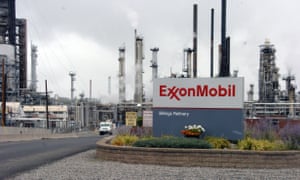It starts, as you can see here, with each company being open and honest internally. Full disclosure to employees, shareholders and customers is a bare min needed to vet a company's assets, liabilities and the true strength of their balance sheet. In essence what risks does that company carry to stakeholders?
Every company, and each industry, should offer us transparency and full disclosure. Then it is up to us to act as knowledgeable consumers and buy smart--or suffer personal consequences. That is good balance in life and a fair economic systems that factors loss of natural capital and quality of life standards as well.
‘Historic’ vote by nearly two-thirds of shareholders will force annual ‘stress test’ to measure how regulation will affect assets

The resolution says Exxon ‘should assess the resilience of the company’s full portfolio of reserves and resources through 2040 and beyond, and address the financial risks associated with such a scenario’. Photograph: Matt Brown/AP
ExxonMobil, the world’s biggest oil company, was compelled by shareholders to be more open about the impact of climate change on its business in a “historic” surprise vote on Wednesday.
The public rebuke came as Donald Trump reportedly prepared to pull out of the Paris climate accord, the agreement forged by close to 200 countries to address climate change.
Some 62% of shareholders voted for the resolution and against Exxon’s management at the company’s annual meeting in Dallas, Texas. The vote to more clearly report how climate change affects Exxon’s business comes as investors are increasingly demanding companies disclose the likely impact of global warming and follows the passing of similar proposals at two smaller energy companies earlier this month.
Edward Mason, head of responsible investment at Church Commissioners for England, which led the vote, said shareholders were showing how out of step the Trump administration had become on climate change. “Trump is acting contrary to Wall Street and the world’s largest investors,” he said. “Climate change is a material financial risk and shareholders want to know how companies will manage the change to a low carbon economy.”
Exxon’s management sought to head off the proposal championed by the pension funds of the Church of England, New York and California and other large shareholders, which will force the company to conduct an annual “stress test” measuring how its oil assets will be affected by climate change regulation and new technology.
Last year, the same proposal was backed by 38% of shareholders who voted.
Addressing the meeting Mason said many of the company’s board members had made clear that “they recognised the significance of the agreed international goals on climate change” in their other roles.
Board member Ursula Burns, former CEO of Xerox, signed the Obama administration’s climate pledge, and fellow board member Kenneth Frazier chairs Merck, a pharmaceutical company that supports “national and international action to address the challenges presented by climate change”, said Mason. He pointed out that another board member, Susan Avery, former president of the Woods Hole Oceanographic Institution, had told the Financial Times: “Clearly climate science is telling us get off fossil fuels as much as possible.”
“Members of the board, do you leave your understanding of climate change at the door when you attend the ExxonMobil board meeting?” Mason asked.
Chief executive Darren Woods said: “We believe the risks of climate change are serious and warrant action, thoughtful action. As a company we are taking action in many ways.”
But he said the company was doing enough to address the impact of climate change and regulation on its business and that the board was against the proposal. “The board believes the company has adequately assessed the future impact of policy developments,” he said.
Earlier this month, shareholders overcame management opposition to similar proposals at Occidental Petroleum and PPL, a large utility holding company, and passed resolutions forcing the companies to more clearly explain how climate change could affect their businesses.
BlackRock, Exxon’s largest shareholder, backed the resolution at Occidental’s shareholders’ meeting, the first time the investment group had voted against a company’s management over climate change.
“When we do not see progress despite ongoing engagement, or companies are insufficiently responsive to our efforts to protect the long-term economic interests of our clients, we will not hesitate to exercise our right to vote,” BlackRock said a statement.
Sue Reid, vice-president of climate and energy at the sustainable investor network Ceres, called the vote “historic”.
“This is a very strong message from investors that climate change matters and must be addressed. Now we need to see Exxon take action.”
New York comptroller Thomas P DiNapoli said: “This is an unprecedented victory for investors in the fight to ensure a smooth transition to a low-carbon economy. Climate changeis one of the greatest long-term risks we face in our portfolio and has direct impact on the core business of ExxonMobil. The burden is now on ExxonMobil to respond swiftly and demonstrate that it takes shareholder concerns about climate risk seriously.”
The ExxonMobil resolution, introduced by the New York State Common Retirement Fund, says that the company “should analyze the impacts on ExxonMobil’s oil and gas reserves and resources under a scenario in which reduction in demand results from carbon restrictions and related rules or commitments adopted by governments consistent with the globally agreed upon 2-degree [C] target”.
The resolution adds: “This reporting should assess the resilience of the company’s full portfolio of reserves and resources through 2040 and beyond, and address the financial risks associated with such a scenario.”
The meeting, the first since former CEO Rex Tillerson left to become secretary of state, was held at the IM Pei-designed Morton H Meyerson symphony center in downtown Dalla

No comments:
Post a Comment